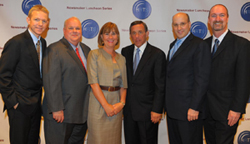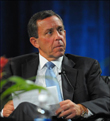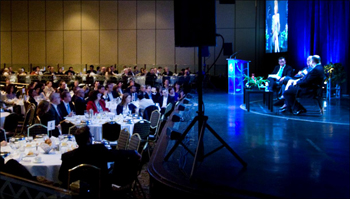|
 An event recap by Chris Davison, davison@intellcap.com An event recap by Chris Davison, davison@intellcap.com
With financial indexes continuing to dive and everyone in Hollywood wondering what happens next, the HRTS put together a very timely panel of Wall Street experts who shared their views on the future of television. The high-powered panel consisting of Jeff Logsdon, Managing Director, BMO Capital Markets; Christa Thomas, Managing Director, JP Morgan Securities; and Alan Gould, Managing Director, Natixis Bleichroeder, gathered together with moderator Dick Lippin, Chairman/CEO of The Lippin Group, on November 20, 2008 at the Hyatt Regency Century Plaza Hotel.
Lippin began on a macro level, asking the panel “historically it has been said that the entertainment i ndustry is relatively recession-proof, do you believe that is still the case today?” Logsdon noted that the companies have really changed, that “they have lots of other businesses that they’re in that really do influence their financials”, added elements that influence their risk exposure and resultant stock performance. Thomas said that “the issues that we’re seeing now are not really specific to the industry that I’m lending to, to the entertainment industry” and so there is trouble across the board. Gould said that he thinks “the entertainment business still is somewhat recession-resistant”, going on to add that stocks of pure play entertainment companies - as opposed to those of larger media conglomerates – are doing quite well, citing Marvel and DreamWorks Animation as examples. ndustry is relatively recession-proof, do you believe that is still the case today?” Logsdon noted that the companies have really changed, that “they have lots of other businesses that they’re in that really do influence their financials”, added elements that influence their risk exposure and resultant stock performance. Thomas said that “the issues that we’re seeing now are not really specific to the industry that I’m lending to, to the entertainment industry” and so there is trouble across the board. Gould said that he thinks “the entertainment business still is somewhat recession-resistant”, going on to add that stocks of pure play entertainment companies - as opposed to those of larger media conglomerates – are doing quite well, citing Marvel and DreamWorks Animation as examples.
 Long or short? Dick Lippin wondered about strategic and tactical orientation, about the long-term view of creating content and meeting audience needs versus the short-term view of meeting quarterly financial expectations. He asked the panel “is this industry narrowcasting who it’s playing to, is it playing to Wall Street or should it be playing more to the consumer?” Logsdon said that “a lot of the money and a lot of the demand for time on the research side over the last five years has really come from the hedge fund Long or short? Dick Lippin wondered about strategic and tactical orientation, about the long-term view of creating content and meeting audience needs versus the short-term view of meeting quarterly financial expectations. He asked the panel “is this industry narrowcasting who it’s playing to, is it playing to Wall Street or should it be playing more to the consumer?” Logsdon said that “a lot of the money and a lot of the demand for time on the research side over the last five years has really come from the hedge fund community” and so as a result “for companies, the report card comes out once a quarter”, this meet-the-numbers focus adding to the volatility of what’s happened to the stocks over the past few years, since “we just don’t live in a Pollyanna world where it’s ‘let’s run this for the long term’”. Gould said that he thinks it varies company by company and that Rupert Murdoch in particular has historically cared less about Wall Street and more about the long-term vision of his company. He also added that the current financial climate has changed the focus for some companies, saying “in the past we have seen the companies playing to Wall Street, making sure they hit their numbers, I think in the current environment and the future environment we’re going to see less so of that”. community” and so as a result “for companies, the report card comes out once a quarter”, this meet-the-numbers focus adding to the volatility of what’s happened to the stocks over the past few years, since “we just don’t live in a Pollyanna world where it’s ‘let’s run this for the long term’”. Gould said that he thinks it varies company by company and that Rupert Murdoch in particular has historically cared less about Wall Street and more about the long-term vision of his company. He also added that the current financial climate has changed the focus for some companies, saying “in the past we have seen the companies playing to Wall Street, making sure they hit their numbers, I think in the current environment and the future environment we’re going to see less so of that”.
 Zooming in from the Wall Street-conglomerate view and focusing on distribution platforms, Lippin next asked “we’ve got broadcast television, we’ve got local stations, we’ve got cable networks and we’ve got satellite – what are your opinions about the long-term prosperity of each of those areas?” Thomas and Logsdon both saw a lot of value coming out of cable networks due to the increasing amount of original content and licensing in that space, Logsdon adding that for local stations, they’re the “first to feel it on the local side, last to recover”. Gould wondered aloud about network television being the prime target for advertisers, asking “when do we hit the tipping point where it is no longer the medium of choice?” Zooming in from the Wall Street-conglomerate view and focusing on distribution platforms, Lippin next asked “we’ve got broadcast television, we’ve got local stations, we’ve got cable networks and we’ve got satellite – what are your opinions about the long-term prosperity of each of those areas?” Thomas and Logsdon both saw a lot of value coming out of cable networks due to the increasing amount of original content and licensing in that space, Logsdon adding that for local stations, they’re the “first to feel it on the local side, last to recover”. Gould wondered aloud about network television being the prime target for advertisers, asking “when do we hit the tipping point where it is no longer the medium of choice?”
Looking into the proverbial crystal ball, Lippin asked each of the panelists for their predictions on growth and  value in 2009. Logsdon said that “when you look at what got us into where we are today, it doesn’t feel like we’ve solved any part of it”, adding that homes are not getting more valuable, banks are not lending more money, and not much wealth is being created, so he thinks that while a recovery will come it may take a while. Thomas agreed with Logsdon, adding “it seems to me that once that you see more thawing in bank lending, in corporate lending and consumer lending, I think that’s really got to be a precursor to anything happening on the equity side”. Gould again wondered about the tipping point in suggesting that the rate of return is relative to the rate of loss, saying “in terms of ‘where do you jump back in?’ it sort of depends on how quick we go down. If we go down 15% in the next month then it may be a month from now, if it takes nine months then you may want to wait that long”. value in 2009. Logsdon said that “when you look at what got us into where we are today, it doesn’t feel like we’ve solved any part of it”, adding that homes are not getting more valuable, banks are not lending more money, and not much wealth is being created, so he thinks that while a recovery will come it may take a while. Thomas agreed with Logsdon, adding “it seems to me that once that you see more thawing in bank lending, in corporate lending and consumer lending, I think that’s really got to be a precursor to anything happening on the equity side”. Gould again wondered about the tipping point in suggesting that the rate of return is relative to the rate of loss, saying “in terms of ‘where do you jump back in?’ it sort of depends on how quick we go down. If we go down 15% in the next month then it may be a month from now, if it takes nine months then you may want to wait that long”.
In closing, Lippin asked the assembled Wall Streeters if they believe in the entertainment industry, if it is a good bet as compared to other industries. Fortunately, Jeff Logsdon said “yes, and I mean solidly. People are not stopping going to the movies, they are watching more TV, they are finding more ways to access it”. Christa Thomas concurred wholeheartedly, saying that “the entertainment industry is here to stay, it will flourish” and “at the end of the day, people are still talking about the cavemen sitting around the fire telling stories, the human experience is one that embraces being entertained”. Alan Gould said “I believe in the entertainment business” and “when we think about the cost structure it reminds me about our pharmaceutical analyst who talks about R&D and you don’t realize, it costs over a billion dollars for every new drug, so maybe our cost structure is not so crazy”. There’s no question that money talks, and fortunately for all of us in Hollywood, Main Street will always vote with their wallets in continuing to consume entertainment in new and different ways, regardless of what is happening on Wall Street.
To see more pictures from this and other events, please go to HRTS' new Photo Gallery!
|


